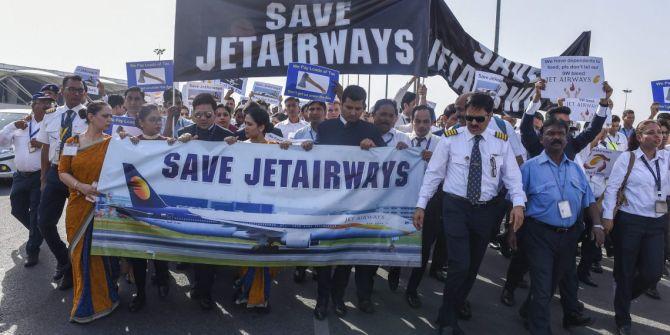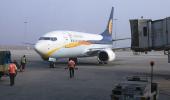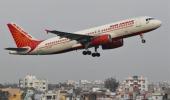'Now we will have real employees as the owner of the airline.'
Arindam Majumder reports.

Vishesh Khanna's career as a pilot is as old as Jet Airways. Of the 25 years he has been in the profession, he has been a Jet employee for 23 years.
For Khanna, who flew the Airbus A330, loyalty towards the brand still persists and despite remaining unpaid for six months, he has opted out of multiple joining calls from IndiGo.
"I still believe Jet will fly. I would wait for that day," he says.
About 5,000 employees like Khanna on Friday, June 28, joined hands with London-based Sanjay Vishwanthan, chairman of private equity firm Adi Partners, to pick up a 75% stake in the company, which is now facing bankruptcy proceedings at a Mumbai court.
Vishwanthan has tried time and again to get a stake in the airline: First, by submitting a bid with now-ousted promoter Naresh Goyal, which was rejected by the lenders, then trying to partner Abu-Dhabi-based Etihad Airways, which too was unsuccessful.
"Previously the process restricted us in many ways like restriction on foreign direct investment norms, inability to get an exemption from open offer. The insolvency proceedings now give us an opportunity to put behind these restrictions. This gives us an opportunity to submit a joint bid with the employees who are the real assets of the company," Vishwanathan said.
But questioned over contours of the bid by journalists, Vishwanthan had sketchy details. He had a business plan, but not the money required to implement the plan.
He had little details over the liabilities of the airline which hasn't paid aircraft lessors, vendors, airports and oil companies for the last eight months.
"Our estimation is that the airline will need around Rs 5,000 crore (Rs 50 billion) to restart operations. The actual quantum of past dues will be known only when we get details from the resolution professional," Vishwanthan said.
A consortium of lenders led by State Bank of India has named Ashish Chhawchharia of Grant Thornton India as the resolution professional for the airline's bankruptcy proceedings. The airline owes around Rs 8,500 crore (Rs 85 billion) to Indian lenders and around Rs 5,000 crore to vendors and lessors.
"I can assure you that source of money will not be a problem for us in this bid," Vishwanathan said.
A successful takeover of an airline by its employees are rare, but not uncommon. One of the most famous cases is US-based United Airlines in the mid-1990s.
Shareholders of UAL Corporation, United's parent, approved the acquisition of a 55% stake by workers in the company in July 1994 under an ESOP plan. The move, however, was accompanied by drastic cuts in pay and other benefits of United's employees.
The scheme worked well initially. But soon issues of mismanagement surfaced. In 2002, the airline, burdened with a $1 billion debt, filed for bankruptcy.
However, employees of Jet Airways feel that if given a chance they will be able to revive the airline with a sound business plan and most importantly their passion for the company.
"After Vishwanathan gave me his plan I communicated with other employees through WhatsApp. In two hours I was able to garner the support of 1,200 employees," said Ashwani Tyagi, general secretary of the employee consortium christened as Society for Welfare of Indian Pilots and one of Jet's senior-most pilots who has been with the airline for 18 years.
Like Tyagi, his colleague P P Singh, a pilot of Jet for 20 years, says they have identified all the missteps which would improve Jet Airways cost structure in three years.
"Till now we had an owner masquerading as employee and taking the airline down," Singh says, taking a dig at promoter Naresh Goyal who is blamed for the missteps that took the airline downhill.
"Now we will have real employees as the owner of the airline."











 © 2025
© 2025